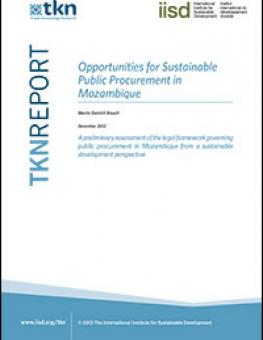
Opportunities for Sustainable Public Procurement in Mozambique
Public procurement—the processes used by governments for the contracting of goods, services and construction works—can promote sustainability and green growth by providing incentives for investment, innovation and scaling of sustainable enterprises, goods, services and infrastructure across the public and private sectors.
Public procurement that includes environmental, economic and social sustainability criteria is often referred to as "green" procurement or sustainable public procurement (SPP).
Although developed countries have taken the lead in promoting SPP, many developing country national and subnational governments are also designing and implementing SPP programs, often in partnership with international development organizations and research institutes. As part of its research on SPP, the International Institute for Sustainable Development (IISD) has studied initiatives and supported policy-makers in Chile (Weller, Claro & Blanco, 2008), Ghana (Liebert, 2012), India (The Energy and Resources Institute (TERI), 2008), South Africa (Hanks, Davies & Perera, 2008), the State of Sao Paulo, Brazil (Brauch, 2012), and Vietnam (Hoang, Do & Perera, 2009).
In assessing a country's efforts to integrate sustainability into its procurement policies, a starting point is the domestic legal framework that governs procurement. A legal framework that consciously takes sustainability into account is the foundation on which effective SPP policies and practices are built.
This commentary presents the results of a preliminary assessment of the potential of Mozambique's "Regulation on Contracting of Public Works, Goods and Services" (Decree No. 15 of 24 May 2010) to support sustainable development and green growth. It contains a complete English translation of the Regulation and presents commentary on its provisions that are or could become most relevant to promoting SPP in Mozambique.
The analysis is intended to inspire conversation with policy-makers and procurement specialists, both in Mozambique and abroad, on how the Mozambican legal framework on public procurement can promote sustainability, whether through a sustainability-oriented interpretation of its current language or through legislative reform. Considering that Mozambique's Regulation on public procurement does not expressly take sustainability into account, this exercise is an essential starting point for discussions on how to better integrate sustainability into public procurement laws, policies and practices in Mozambique.
You might also be interested in
Green Public Procurement in India
This report analyzes the status of green public procurement (GPP) in India and suggests key strategies for advancing sustainable procurement practices.
The Role of Multilateral Development Banks for Low-Carbon Procurement in the Infrastructure Sector
This report examines the critical role of multilateral development banks (MDBs) in advancing low-carbon procurement within the infrastructure sector.
Agreement on Climate Change, Trade and Sustainability: A landmark pact for trade and sustainability
The ACCTS pact, signed by Costa Rica, Iceland, New Zealand, and Switzerland, aligns trade and environmental policies, tackling fossil fuel subsidies, eco-labels, and green trade.
Addressing Carbon Leakage: A toolkit
As countries adopt ambitious climate policies, this toolkit examines strategies to prevent carbon leakage—when production and emissions shift to nations with weaker climate policies—and explores the trade-offs of each approach.